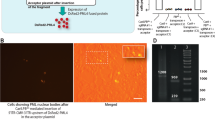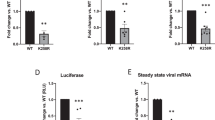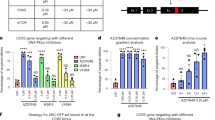Abstract
φc31 integrase is investigated as a novel tool for nonviral gene therapy as the enzyme can direct site-specific integration into a host chromosome. In order to investigate effects of φc31 integrase expression in normal human cells, we have generated stably transfected primary human fibroblasts expressing the enzyme. All control cells were cytogenetically normal, but in cells expressing φc31 integrase, numerous chromosomal abnormalities including various translocations were found, suggesting that the enzyme itself acts as a mutagen.
This is a preview of subscription content, access via your institution
Access options
Subscribe to this journal
Receive 12 print issues and online access
$259.00 per year
only $21.58 per issue
Buy this article
- Purchase on Springer Link
- Instant access to full article PDF
Prices may be subject to local taxes which are calculated during checkout


Similar content being viewed by others
References
Thorpe HM, Smith MC . In vitro site-specific integration of bacteriophage DNA catalyzed by a recombinase of the resolvase/invertase family. Proc Natl Acad Sci USA 1998; 95: 5505–5510.
Thyagarajan B, Olivares EC, Hollis RP, Ginsburg DS, Calos MP . Site-specific genomic integration in mammalian cells mediated by phage phiC31 integrase. Mol Cell Biol 2001; 21: 3926–3934.
Chalberg TW, Portlock JL, Olivares EC, Thyagarajan B, Kirby PJ, Hillman RT et al. Integration specificity of phage varphiC31 integrase in the human genome. J Mol Biol 2005; 357: 28–48.
Ginsburg DS, Calos MP . Site-specific integration with phiC31 integrase for prolonged expression of therapeutic genes. Adv Genet 2005; 54: 179–187.
Olivares EC, Hollis RP, Chalberg TW, Meuse L, Kay MA, Calos MP . Site-specific genomic integration produces therapeutic Factor IX levels in mice. Nat Biotechnol 2002; 20: 1124–1128.
Ortiz-Urda S, Thyagarajan B, Keene DR, Lin Q, Fang M, Calos MP et al. Stable nonviral genetic correction of inherited human skin disease. Nat Med 2002; 8: 1166–1170.
Ortiz-Urda S, Thyagarajan B, Keene DR, Lin Q, Calos MP, Khavari PA . PhiC31 integrase-mediated nonviral genetic correction of junctional epidermolysis bullosa. Hum Gene Ther 2003; 14: 923–928.
Held PK, Olivares EC, Aguilar CP, Finegold M, Calos MP, Grompe M . In vivo correction of murine hereditary tyrosinemia type I by phiC31 integrase-mediated gene delivery. Mol Ther 2005; 11: 399–408.
Ehrhardt A, Xu H, Huang Z, Engler JA, Kay MA . A direct comparison of two nonviral gene therapy vectors for somatic integration: in vivo evaluation of the bacteriophage integrase phiC31 and the Sleeping Beauty transposase. Mol Ther 2005; 11: 695–706.
Mitelman F . ISCN: An International System for Human Cytogenetics Nomenclature. S Karger: Basel, Switzerland, 1995.
Loonstra A, Vooijs M, Beverloo HB, Allak BA, van Drunen E, Kanaar R et al. Growth inhibition and DNA damage induced by Cre recombinase in mammalian cells. Proc Natl Acad Sci USA 2001; 98: 9209–9214.
Belteki G, Gertsenstein M, Ow DW, Nagy A . Site-specific cassette exchange and germline transmission with mouse ES cells expressing phiC31 integrase. Nat Biotechnol 2003; 21: 321–324.
Hollis RP, Stoll SM, Sclimenti CR, Lin J, Chen-Tsai Y, Calos MP . Phage integrases for the construction and manipulation of transgenic mammals. Reprod Biol Endocrinol 2003; 1: 79.
Groth AC, Fish M, Nusse R, Calos MP . Construction of transgenic Drosophila by using the site-specific integrase from phage phiC31. Genetics 2004; 166: 1775–1782.
McKinlay Gardner RJ, Sutherland GR . Chromosome Abnormalities and Genetic Counseling. Oxford University Press: Oxford, 2004, pp 142–162.
Acknowledgements
Dr Michele Calos, Stanford, is thanked for the generous gift of the plasmids pCMVInt and pTA-attB. This work was supported by the The Danish Medical Research Council, The Velux Foundation and the Novo Nordisk Foundation.
Author information
Authors and Affiliations
Corresponding author
Rights and permissions
About this article
Cite this article
Liu, J., Jeppesen, I., Nielsen, K. et al. φc31 integrase induces chromosomal aberrations in primary human fibroblasts. Gene Ther 13, 1188–1190 (2006). https://doi.org/10.1038/sj.gt.3302789
Received:
Revised:
Accepted:
Published:
Issue Date:
DOI: https://doi.org/10.1038/sj.gt.3302789
Keywords
This article is cited by
-
PhiC31/PiggyBac modified stromal stem cells: effect of interferon γ and/or tumor necrosis factor (TNF)-related apoptosis-inducing ligand (TRAIL) on murine melanoma
Molecular Cancer (2014)
-
Improved site-specific recombinase-based method to produce selectable marker- and vector-backbone-free transgenic cells
Scientific Reports (2014)
-
Intragenic integration in DLC1 sustains factor VIII expression in primary human cells without insertional oncogenicity
Gene Therapy (2014)
-
MiMIC: a highly versatile transposon insertion resource for engineering Drosophila melanogaster genes
Nature Methods (2011)
-
Biosafety Assessment of Site-directed Transgene Integration in Human Umbilical Cord–lining Cells
Molecular Therapy (2010)



